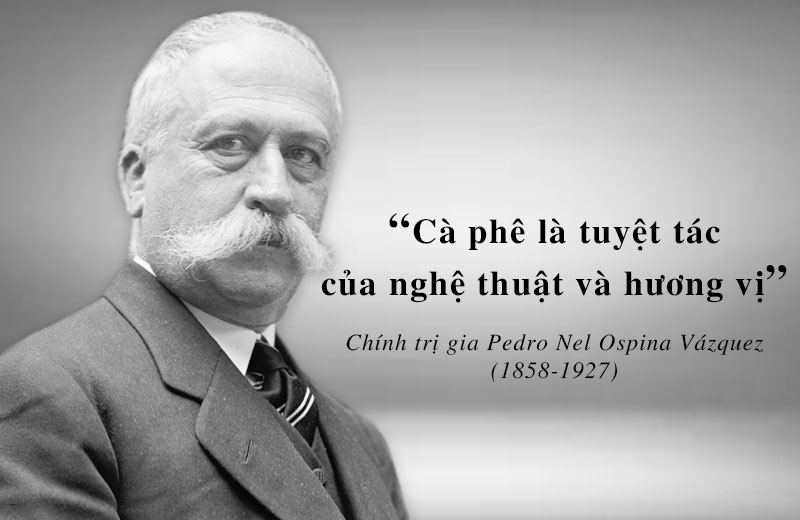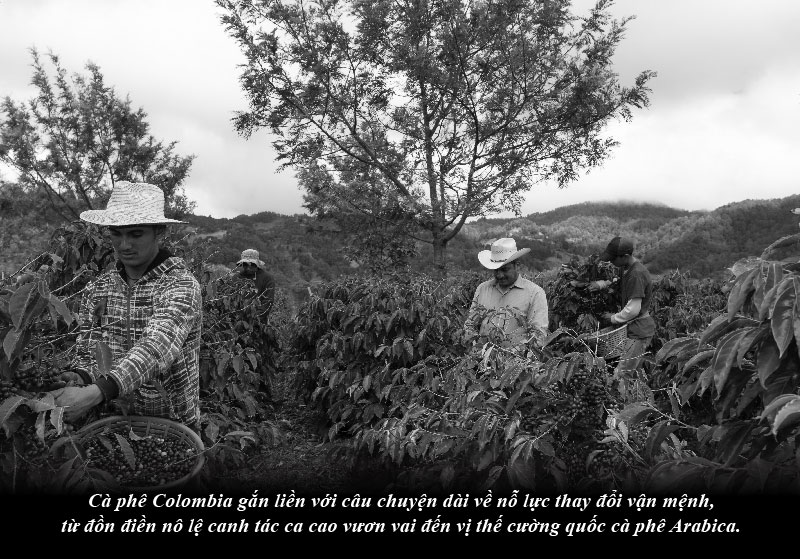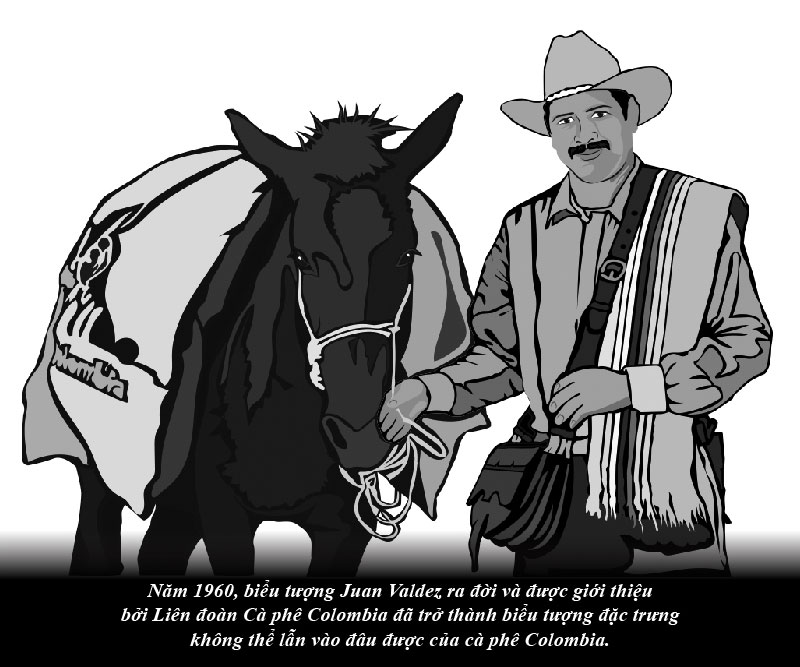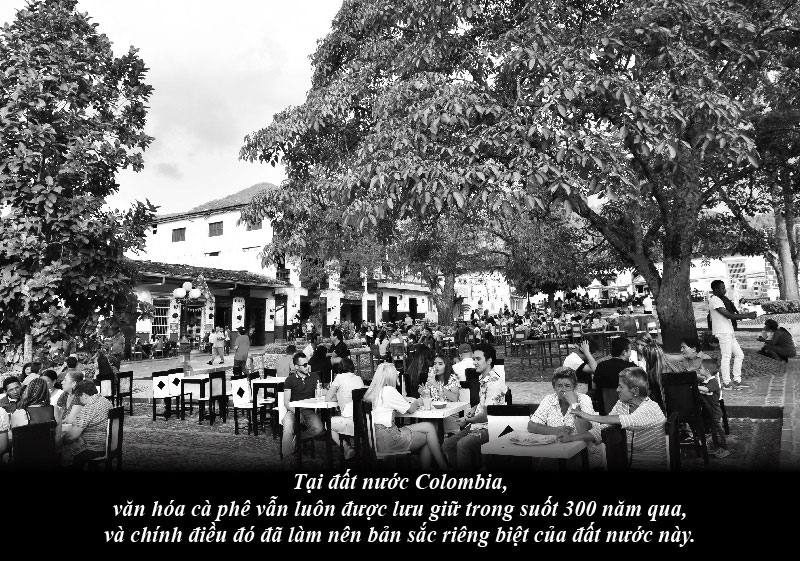Article 64: The journey to affirm the distinctive mark of Colombian coffee
Coffee in the minds of Colombians is the seed that brings blessings, changes the country’s destiny, and affirms the country’s distinctive mark on the international stage.

“Coffee is a masterpiece of art and taste” Politician Pedro Nel Ospina Vázquez (1858-1927)
The process of confirming the Colombian coffee imprint on the world coffee map
The long history of coffee farming traditions has made Colombia famous around the world. The country is located in the South of America with large agricultural lands in the Andes and a tropical climate is a great place for coffee farms to develop. It has up to 600,000 people involved in the coffee industry, providing 12% of the total Arabica coffee in the world.
Coffee appeared in Colombia in 1723, but it was not until 1835 that commercialization took place with 2,560 pounds of coffee exported to the United States. Before that, Colombian farmers were very reluctant to cultivate the strange plant, which had to be taken care of for three to four years to harvest the first crop. However, the priest Francisco Romero saw the economic and cultural potential of coffee for Colombia’s future. He came up with the idea of replicating this plant by a common practice, requiring parishioners to come to confession to plant coffee as a means of penance. This started Colombia as the world’s third largest coffee producer, founded on the sacrament of reconciliation.

Columbia Coffee is associated with a long story of efforts to change destiny, from the slave plantation of cocoa farming to the status of Arabica coffee power.
In the early 19th century, many scattered coffee material regions gradually merged into large farms to revolutionize the Colombian coffee industry, promoting a shift to a more sustainable development model. From here Colombia experienced the most significant period of growth in its history. It is estimated that the coffee trade profits 80% of Colombia’s total exports, providing a livelihood for about a third of the country’s total population.
The expansion of the coffee industry laid the groundwork for Colombia’s economic integration after World War II. Before 1950, due to the steep terrain and relatively primitive transportation network, businesses were loosely connected. As the coffee industry dominated the production sector, the government focused on improving transportation facilities, building facilities, and transport infrastructure, eventually completing the network linking coffee industrial zones, promoting the process of urbanization, bringing the country into the modern era. The improved economic position also kept Colombia strong from the Great Depression of 1929.
Moreover, in 1927, the birth of the Federación Nacional de Cafeteros de Colombia (National Federation of Coffee Growers of Colombia) played an active role in the overall development of the country. The federation helped Colombian farmers improve coffee quality through a deeply linked farming system, as well as transferring optimal coffee production techniques. In 1960, the Juan Valdez logo was born and became a distinctive brand mark of Colombian coffee in the export market.

In 1960, the Juan Valdez logo was born and introduced by the Colombian Coffee Growers Federation, becoming the unmistakable symbol of Colombian coffee.
After more than 300 years, Colombia has become the 3rd largest coffee producing country in the world after Brazil and Vietnam. In 2007, the European Union granted Colombian coffee a Protected Geographical Indication status, and in 2011 UNESCO declared the Colombian Coffee Cultural Landscape a World Heritage Site.
Coffee – the heritage of Colombia
Originating as a source of life, the coffee bean has become a symbol of Colombian identity. Colombian coffee is associated with a long story of efforts to change destiny, from the slave plantation of cocoa farming to the status of the Arabica coffee power.
The difference in the taste of Colombian coffee is mainly due to the wonderful climate, perfect soil and caring dedication of the people. Colombians think, they are blessed with great biodiversity, ideal climate and geography to grow the most delicious Arabica coffee in the world. Located near the equator – a unique location where two seasons of coffee can be harvested in one year, Colombia can therefore provide fresh coffee year round. Because coffee is always considered a blessing, for hundreds of years, Colombians have cared for and harvested coffee with all respect and enthusiasm. They do not use machines but hand-pick the ripe coffee beans, so coffee originating from Colombia is always of the same quality.

In Colombia, coffee culture has always been preserved for the past 300 years, and that is what makes this country’s unique identity.
Colombia’s long-standing coffee-growing region is not merely the country’s important coffee raw material, but an iconic cultural treasure. It’s where people have adapted over hundreds of years to challenging geographical and climatic conditions to grow environmentally sustainable coffee. Where the economy – culture is developed from the traditional origin of coffee production.
Therefore, the Colombian coffee culture landscape has been recognized by UNESCO as a world heritage site. The tourism industry even organizes experience tours to coffee growing areas, to explore the nature, climate and soil that create the rich aroma of Colombian coffee. Hundreds of coffee farms were built spread across the Quindio, Caldas, Risaralda and Valle del Cauca regions. The Colombian government also built the National Coffee Park in Montenegro and made this place a place to promote Colombian coffee culture closer to the public.
Through a history of ups and downs, the coffee tree has made a strong Colombian country economically, politically stable and imbued with identity. More than just the efforts in building the Colombian coffee brand mark on the world map, it is the construction, preservation and spread of coffee culture as well as coffee farming practices that have formed the Colombian identity.
Not only selecting the best coffee beans from the coffee capital of Buon Ma Thuot (Vietnam) and Colombia, Trung Nguyen Legend coffee experts also select the best coffee beans coming from the most famous raw material regions in the world such as: Brazil, Ethiopia, Jamaica; combining the most modern technology and mythical Eastern know-how to create unique and special coffee masterpieces, worthy of being the elixir for the brain, the elixir for creativity. Enjoying great energy coffees, reading books from the Life Changing Foundational Bookcase, carefully selected by the Chairman of Trung Nguyen Legend Group, Dang Le Nguyen Vu himself, discussing big ideas and challenges of the times at the coffee shop – which is famously known as the “Sidewalk Academy”, the meeting place of great souls… will help each individual to have the right and comprehensive knowledge power, which will in turn transform into spiritual strength, material strength, physical strength to go to authentic wealth and happiness for each individual and create strength and influence for the people and the nation.
THE REAL COFFEE
ROASTED ONLY FOR PEOPLE OF WISDOM!
Source: “The Philosophical Way of Coffee” – copyright by Trung Nguyen Legend


